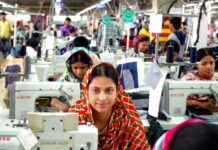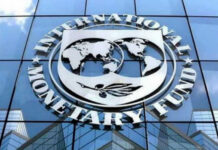German envoy says shutdowns, bad factory conditions may pull down the rate below 6pc
Bangladesh’s economic growth rate will hit a record low due to a combined effect of political unrest and bad factory conditions that may crowd out investment and export orders, a top diplomat said.
“These two factors together worry the bilateral chambers, as they put Bangladesh at risk of having the growth rate below 6 percent for the first time in years,” German Ambassador Albrecht Conze told The Daily Star in an interview on Saturday.
Bangladesh will suffer from an image crisis in its export destinations following the Tazreen fire and NOW amplified with the Savar building collapse, the envoy said.
He said the negative publicity will affect trade figures. “When trade figures are affected, growth figures, too, would be affected.”
That is alarming as Bangladesh cannot afford to have growth rates below 6 percent, as that is the line from which one can continue to leave poverty behind. “If you are below that line then there is stagnation.”
Conze, who assumed his current role in 2012, said initiatives are ongoing to bring the two major political parties to a negotiating table to solve the crisis.
The ambassadors and envoys of the OECD (Organisation for Economic Co-operation and Development) countries already discussed the idea with the foreign minister last week.
“We will also soon have a chance to discuss the issue with the leading members of the opposition. Yes, we are all active in a constructive way to support the basic idea of the UN envoy, which is to hold dialogues.”
The United Nations should be driving this effort, he said.
Unless there is any dialogue, the level of confrontation will remain dangerously high, which would affect everybody’s security and the economy, the envoy added.
Conze said the two major political parties — the ruling Awami League and the opposition BNP — will have to take up the ball the UN envoy has set
running.
About the garment sector, Conze said the buyers had long avoided insisting on adequate fire and building safety standards from their partners in Bangladesh as they seemed to be able to operate without that.
“Only some responsible buyers have sent representatives to Dhaka to do controls and really check all the issues in the factories where they produce — but many have not.”
The envoy termed the signing of Bangladesh’s fire and building safety accord by 32 major international buyers as an important development.
“The BGMEA [Bangladesh Garment Manufacturers and Exporters Association] has welcomed that. Now they finally know the terms of references and what they will have to face in terms of pressure from the buyers.”
“So, one is not pricing for more than the other. They are all now going after the same standards — what was missing so far. Now the BGMEA has a text which it can deal with. They have stopped talking and started to act, which I welcome.”
Citing a big fire in a New York garment factory in 1907 which triggered upgrades in social and safety standards in the US, he said the Rana Plaza tragedy can have a similar effect on Bangladesh.
Conze also said he does not think that the international buyers, especially those from the European Union, would abandon Bangladesh, but they could cut a certain percentage of their sourcing and try other countries.
“That is something the BGMEA should really try to avoid. They can only be avoided by acting, not by words.”
The envoy said the momentum created by the 32 major garment buyers can bring about quick action.
“I don’t think any major company can do anything else than complying with the standards, whether they are members of the alliance or not.”
About the amended labour law, he said: “I think it is an important first step.”
Conze, who joined the foreign service in 1981 and have served in Hong Kong, Beijing, Vienna, Warsaw, Tunis, Khartoum, Moscow and Harare, suggests Bangladesh change its attitude towards trade unions to improve its labour standards.
Many garment producers still have the attitude that the trade unionists are enemies — this attitude must change. It is against international principles for workers rights, as laid down by the ILO, he said.
“Now Everybody should try and work on how to receive trade unions as a partner in the social fabric of Bangladesh, and not as a destructive force.”
The envoy also said the objective of the country’s garment industry should not be to become the biggest in the world, but to be the best.
“If you can put quality first, then you can re-establish your reputation.”
On the garment makers’ plea that they cannot afford to improve the industrial conditions as international buyers do not pay them much, Conze said: “I don’t know their calculations, but I still assume they are wrong.”
Even with the safety and building standards, Bangladesh will still remain competitive in terms of pricing, he said.
Source: The Daily Star










